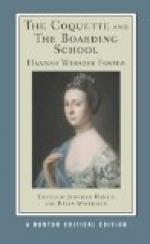Thus, kind reader, have I accomplished the task assigned me with fidelity to truth and to humanity, and here lay the offering on the altar of universal love without excuse.
JANE E. LOCKE.
BOSTON, 1854.
NOTE.—For important facts which have greatly aided me in preparing this prefatory chapter I am much indebted, as I would here gratefully acknowledge, to Ezekiel White, Esq., of Easthampton, and Mrs. H.V. Cheney, of Montreal.
J.E.L.
[Footnote A: John Whitman, whose father was brother to the grandfather of “Eliza Wharton,” married a daughter of Rev. Mr. Foster, of Stafford, Connecticut, who afterwards settled in Stow, Massachusetts, and who was father of Rev. John Foster, of Brighton, Massachusetts, the husband of the author of this book.]
THE COQUETTE;
OR,
THE HISTORY OF ELIZA WHARTON.
LETTER I.
TO MISS LUCY FREEMAN.
NEW HAVEN
An unusual sensation possesses my breast—a sensation which I once thought could never pervade it on any occasion whatever. It is pleasure, pleasure, my dear Lucy, on leaving my paternal roof. Could you have believed that the darling child of an indulgent and dearly-beloved mother would feel a gleam of joy at leaving her? But so it is. The melancholy, the gloom, the condolence which surrounded me for a month after the death of Mr. Haly had depressed my spirits, and palled every enjoyment of life. Mr. Haly was a man of worth—a man of real and substantial merit. He is, therefore, deeply and justly regretted by his friends. He was chosen to be a future guardian and companion for me, and was, therefore, beloved by mine. As their choice, as a good man, and a faithful friend, I esteemed him; but no one acquainted with the disparity of our tempers and dispositions, our views and designs, can suppose my heart much engaged in the alliance. Both nature and education had instilled into my mind an implicit obedience to the will and desires of my parents. To them, of course, I sacrificed my fancy in this affair, determined that my reason should concur with theirs, and on that to risk my future happiness. I was the more encouraged, as I saw, from our first acquaintance, his declining health, and expected that the event would prove as it has. Think not, however, that I rejoice in his death. No; far be it from me; for though I believe that I never felt the passion of love for Mr. Haly, yet a habit of conversing with him, of hearing daily the most virtuous, tender, and affectionate sentiments from his lips, inspired emotions of the sincerest friendship and esteem.




